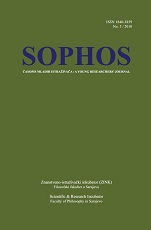Poetika neorealizma
Poetics of Neorealism
Author(s): Mirza MejdanijaSubject(s): Philosophy
Published by: Filozofski fakultet u Sarajevu - Znanstveno-istraživački inkubator
Keywords: crisis of conscience; novella; novel; ordinary man; élan; enthusiasm; truth; authenticity
Summary/Abstract: In the 1930s, Italy saw a stronger influence of works by foreign authors which contributed to a crisis of conscience among Italian artists. This is how the first phase of Italian cultural and literary revival started. In the period preceding World War II, writers needed to be particularly cautious, which is why they chose the novella as the ideal form of expression that would create a bond between the author and the reader. The novel, however, appeared in its full splendor only after World War II and was characterized by a search for the validity of facts, an unforced search conducted in a moderate and accurate manner. The truth became an absolute inner imperative present in every word. It had to be presented with an utmost faithfulness, keeping its shape and authenticity, which is why the authors chose the adequate language and techniques, using everyday language and spontaneous dialog. These works of art promised not to distance themselves from everyday life, to show relentless calamities of an ordinary man, ceaselessly looking for the truth that would make the very same man act and give meaning to his own life. These aspirations gave rise to the phenomenon of Neo-Realism, whose precepts, norms and principles developed spontaneously and were not products of any particular school.
Journal: Sophos- časopis mladih istraživača
- Issue Year: 2010
- Issue No: 03
- Page Range: 161-173
- Page Count: 13
- Language: Bosnian

